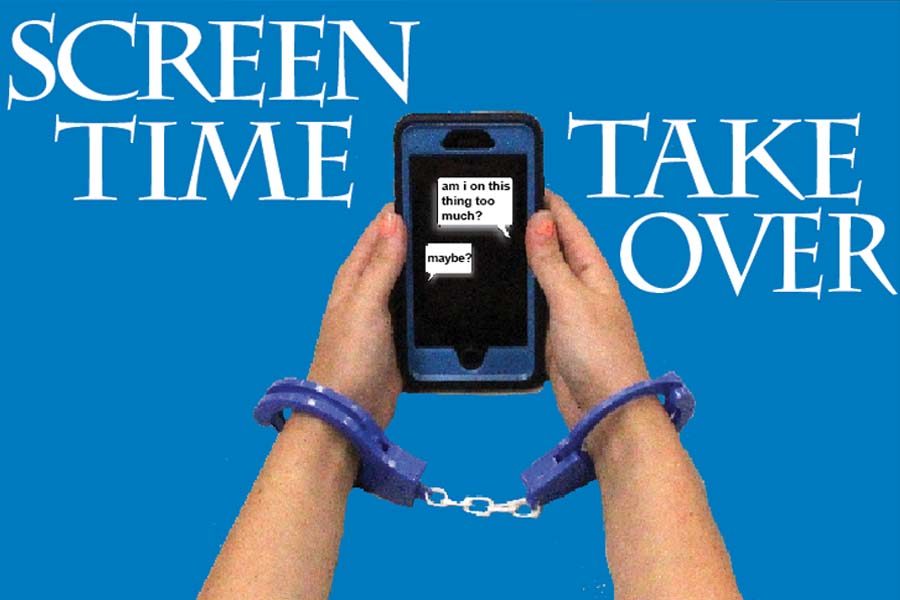Media usage dominates lives
The student was walking in front of the library with his friends, going to class. Caught up in conversation, he turned his head to look behind him and walked into a girl in front of him. She scoffed at him as if he had hit her with his car and not his chest. He apologized, feeling odd.
The collision wasn’t caused by the innocent student going to class but by the female who was solely focused on her cellphone, thumbs flying rapidly over the keys.
Scenarios like this were one of the risks of letting media take over. It was for this reason that the new “no headphones” rule was established this year after adminstration saw that students were not paying attention in class.
“We got tired of kids walking around with headphones and going into class still wearing them,” Assistant Principal Trevor Scott said. “They would hide them in their hair or their sleeves or whatever and not take them out. If they can’t help themselves, then we have to help them.”
The pitfalls of excess screen time have been proven by a multitude of scientific studies. In a study done by Simplyhealth magazine, 84 percent of 18-to-24 year olds admitted having back pain from being slumped over their phones. The problem has become so prevalent, the cause of the pain has been termed “iPosture.”
People have become so attached to their “spare brains” that families have had to make rules about screen time, banning phones from the dinner table or adopting similar restrictive rules. Senior Joe Caro’s family uses the addiction to its phones to determine who pays the bill.
“My dad made this new rule,” Caro said. “Whenever we go out to eat at a restaurant, we have to stack our phones in the middle of the table. If yours go off, and you grab it, then you have to pay for the food. Whoever grabs their phone first is the one who has to pay.”
While screens detract from valuable family time, they also often take away the most valuable thing a teen needs–nine hours of uninterrupted sleep.
“I didn’t get enough sleep last night,” senior Maegan Hand said. “I was on my phone all night. Because of that, I ended up falling asleep during first period.”
According to the Simplyhealth study, only 20 percent of adolescents get the recommended nine hours of sleep on school nights, and 45 percent sleep fewer than 8 hours, in part due to attention-stealing devices.
Cellphones aren’t the only culprits. Gaming consoles and televisions are at fault, too. Freshman Ethan Long said it’s not his phone but his Xbox that he spends that dominates his time.
“I play on my Xbox all day when I’m home–mostly Fortnite,” Long said. “My eyes will start hurting if I don’t take a break. It’s mainly because I have contacts. I have special ones that I wear, they’re designed for looking at screens.”
Lancet Child & Adolescent Health confirms that limiting children’s recreational screen time to less than two hours a day, paired with sufficient sleep and physical activities improves cognition.
Common Sense Media said that 36 percent of parents feel they argue with children over devices. Parents, like Caro’s, ban screens from the table. Others, like senior Amy Segura’s parents, set a screen curfew.
“I have to make sure my TV is off before I go to bed,” Segura said.
In a mobile consumer survey by Deloitte Global, smartphone owners check their phones at least and average of 47 times a day. Eighty-five percent use their devices while talking to friends and family.
“I get text messages a lot during class,” Hand said. “I’m able to ignore it for like three minutes before I have to look. I’ve missed a lot of important things in class, especially during math.”
A study by Journal Pediatrics found that students couldn’t concentrate in their homework for more than two minutes without distracting themselves with screens.
“I’m not really on my phone a lot, but when I’m at home, my first choice is going on my phone rather than doing homework or being responsible or productive,” junior Jaedyn Gates said.
Social media not only affects physically but emotionally as well.
The phenomenon that results when teens spend too much time on social networking sites is known as “Facebook Depression.”
“I feel lonely when no one is texting me,” freshman Sami Nix said. “I feel unwanted and lonely.”
With so much life ahead of them, teens have trouble putting down their screens and just living. While many see the effects of their screen time as bad, they don’t have the will power to stop what will damage their lives in the long run.




